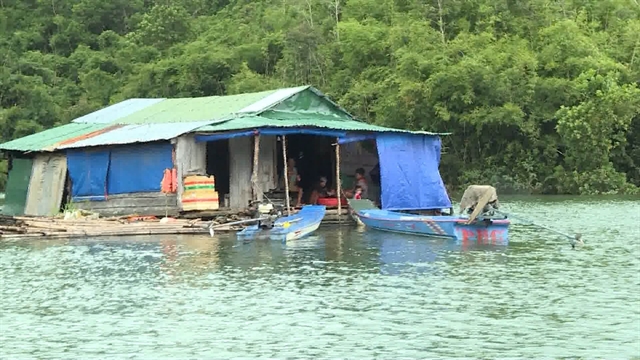 Society
Society


|
| People living in make-shift floating houses on the reservoir of Đồng Nai Hydropower Plant 3 in Đắk Nông Province. — VNA/VNS Photo |
ĐẮK NÔNG — The lives of people living in a floating fishing village on the reservoir of Đồng Nai 3 Hydropower Plant in the Tây Nguyên (Central Highlands) province of Đắk Nông have never been easy, but it's getting more difficult especially during the COVID-19 pandemic.
The local authority has offered assistance to help them overcome their difficulties.
Currently, there are total 28 households living in the 'floating village' on the reservoir of Đồng Nai 3 Hydropower Plant in the province's Đắk Glong District.
Most of them emigrated from An Giang and Kiên Giang provinces, even from Cambodia, to live and make a living by fishing since 2010 when the reservoir started to store water for hydro-electricity.
They built floating houses on the reservoir to live, catch fish and farm fish in cages. Their lives are very difficult, often without access to basic essential services.
In the past two years, due to the impact of the COVID-19 pandemic, the number of customers for fish have been reduced so that it has badly affected the lives of the households.
Nguyễn Thị Nguyệt, 47, who has lived in the fishing village for 10 years, said: “My family had raised fishes in cages in the reservoir for the past three years.”
“Every year, we harvested dozens of tonnes of fish."
But this year, due to the pandemic, there were no buyers. This made life more difficult for her family.
“Due to the COVID-19, it was hardly to sell the farmed fish because many customers were in lockdown areas,” Nguyệt said.
“Now I just hope to sell fish to get money for this Tết (Lunar New Year)."
In the same situation, Nguyễn Thị Thành, 61, who has lived here since 2013, said that there had never been a year with as many changes and disturbances as 2021.
"The COVID-19 pandemic has directly affected my family’s life," Thành said.
Thành and her husband do not have stable jobs. All household expenses are based on her husband's fishing.
Thành said: “In recent years, the fishery resources in the reservoir had gradually been exhausted, making my family's life more and more difficult.”
The amount of fish was so small that her husband just fished a few breams which were sold for small money that was not enough to buy daily essentials.
So, for recent months, Thành had to buy food on credit.
Đồng Nai 3 Hydropower Plant is built on the Đồng Nai River with a basin area of more than 2,400sq.km.
The fishing village is located on the reservoir of Tà Đùng National Park. Since the beginning of 2010, when this area started to store water for hydro-electricity, people in the locality had come to live and make a living by fishing.
But after a while, many struggling households had the desire to go to the mainland.
Đoàn Văn Phương, deputy chairman of People’s Committee of Đắk Glong District, said that most households in the fishing village were poor ones coming from other provinces.
Currently, many households have temporary residence certificates in the district but they usually move to the neighbouring province of Lâm Đồng for fishing so it was difficult to manage, said Phương.
For years, the district regularly encouraged people to leave the floating village and buy land to live stably in the areas of Đắk Som Commune.
To help the people stabilise their lives, the district authority had implemented many policies, especially social security policies for the poor, including assistance of healthcare insurance, subsidies for the elderly, and schooling incentives for children, Phương said.
During holidays such as National Day and Lunar New Year, the district and other benefactors often visited and gave gifts for the households, he added. — VNS




